How to win an Oscar: Parasite and South Korea’s quest for cultural prestige
On 9th February 2020, Parasite became the first foreign-language film to win a best picture Oscar. In DG #38 Matthew Lee told the story of how big business, politicians and artists in South Korea combined forces to pave the way for director Bong Joon-ho’s victory
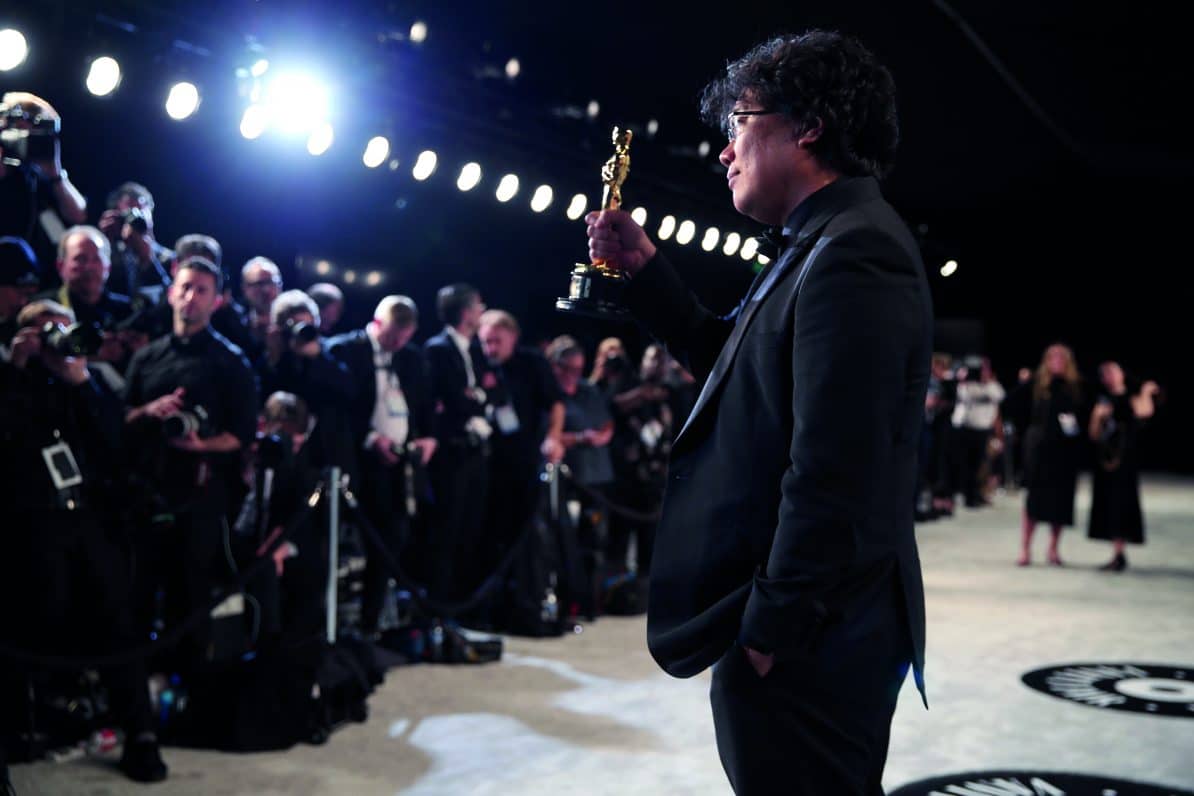
Bong Joon-ho displays one of the four Academy Awards won by his film Parasite as he attends the 2020 Vanity Fair Oscars party. Photo: Mark Ralston / AFP via Getty Images
9th February 2020 (Taken from: #38)
There was shock in the Dolby Theatre when Parasite won best picture. Bong Joon-ho’s masterpiece about a working-class family who deviously swap their dank basement flat for a wealthy family’s mansion had already picked up three gongs, but few expected it could win the biggest prize in cinema. An Academy not renowned for its boldness, which a year earlier had handed the best picture award to the bland, inoffensive Green Book, didn’t appear likely to award the prize to a foreign-language film for the first time in its history, let alone to one as subversive as Parasite.
Until recently the Oscars had treated films like Parasite as unwelcome visitors, ghettoised in the ‘foreign language’ category. They were seen as too alien, too different to qualify for the main competition. And yet here they were, interlopers smashing through the glass ceiling. The have-nots unexpectedly, thrillingly, having it all.
In his acceptance speech for best original screenplay earlier in the night, Bong, with his black bow-tie barely visible over an equally dark shirt, said that although he “never wrote to represent his country”, this win was “very personal to South Korea”. It certainly was. No Korean film had been as much as nominated for an Oscar before, not even in the best foreign-language category (rebranded ‘Best International Feature Film’ in 2019). Parasite had already won the country’s first Golden Globe, for the best foreign-language film, as well as the Palme d’Or at Cannes, but this was a whole new ball game.
“Parasite winning the best picture Oscar felt a bit like the World Cup in 2002,” says Mark Russell, author of Pop Goes Korea. On that occasion a late ‘golden goal’ by Ahn Jung-hwan saw the unfancied host nation knock out three-times world champions Italy – and three million people flood the streets of the South Korean capital, Seoul, to celebrate. “It was the same feeling. You hope it’s going to happen but you don’t really think it can,” says Russell. “But then it does.”
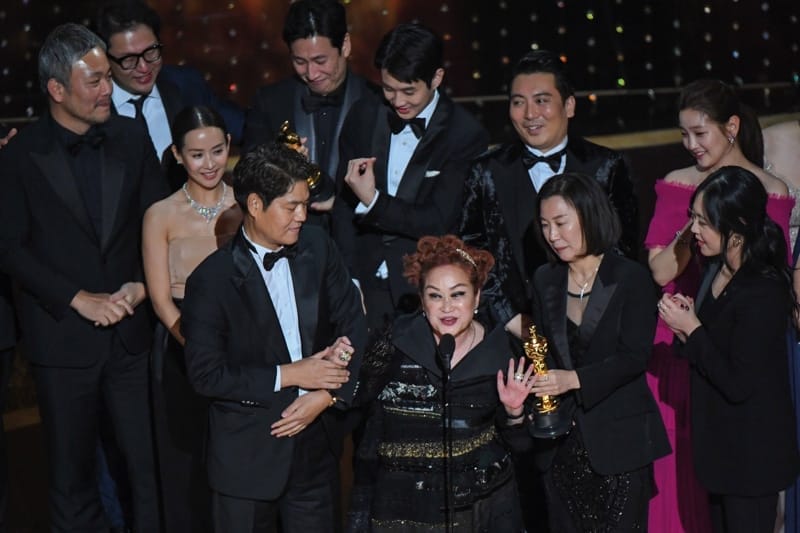
Parasite executive producer Miky Lee accepts the award for best picture alongside the film’s cast and crew at the 92nd Oscars at the Dolby Theatre in Hollywood, 9th February 2020. Photo: Mark Ralston / AFP via Getty Images
“I think I screamed when I heard about Parasite winning,” says Korean-American writer Euny Hong. “I simply couldn’t believe it. My stomach was doing somersaults and I felt this tremendous sense of pride that I don’t think I’ve felt with anything else.” She wasn’t the only Korean making a noise. One presenter had to apologise to viewers for yelling with joy on live TV when the winner was announced. Celebrations erupted across the country, but on social media rather than on the streets, partly because it happened on a Monday lunchtime, and partly because the coronavirus outbreak had already begun to affect everyday life.
As the socially distanced party got started in Bong’s homeland, a diminutive woman took the microphone at the Dolby Theatre. “I really, really, really want to thank our Korean film audience,” said the film’s executive producer, although her job title hardly does justice to the role she played in getting Parasite onto this Hollywood stage, at this special moment. For Miky Lee, a plan hatched more than a quarter of a century earlier had just been spectacularly realised.
Gong girl
It all started with CGI dinosaurs. In May 1994 one of South Korean president Kim Young-sam’s advisors told him that the global income earned by Jurassic Park was equal to the export of 1.5 million Hyundai cars. Apparently craving a blockbuster movie money-maker of his own, Kim used a presidential decree to pass a new law that would provide tax incentives to corporations entering film production.
In February 1995 the director of Jurassic Park invited a group of Samsung executives to his home. Along with ex-Disney boss Jeffrey Katzenberg and music magnate David Geffen, Steven Spielberg had recently founded the DreamWorks film studio, but the trio were struggling to raise the $900 million investment money they needed. “The Samsung chairman, Lee Kun-hee, was a bit of a film buff,” says Geoffrey Cain, author of newly published book Samsung Rising. “He’s an interesting character, a bit of a recluse and very eccentric, and he got this idea to court Spielberg, get a stake in DreamWorks and turn Samsung into a multimedia and cinema company and not just a manufacturer.”
That idea was planted by his niece, Miky Lee (also known as Lee Mie-kyung), who was living in the US and who had heard from an LA lawyer that the all-star film firm was on the lookout for investors. “So the DreamWorks co-founders and the Samsung executives met at Spielberg’s Pacific Palisades home,” says Cain. “They were sipping their white wine and eating their Chilean sea bass and suddenly Samsung offered the full $900 million. But they said they would need to have approval over all DreamWorks films and that the company would have to hire Korean staff from Samsung.”
Why would I let a semiconductor manufacturer tell me how to make Jurassic Park?”
Samsung in 1995 was very different to today’s tech giant. Euny Hong recalls that when she moved to South Korea with her family in the 1980s, the firm made such derided products that it was known among the local expat community as ‘Samsuck’. But one thing at which it did excel was the production of semiconductors, a fact chairman Lee made sure to mention over dinner. Spielberg later told Time magazine that “the word ‘semiconductor’ must have been used 20 times” during the meal (a Samsung spokesperson denied the director’s account, insisting that Lee only mentioned semiconductors twice). “Of course, if you’re Steven Spielberg you’re thinking to yourself, ‘Who are these guys?’” says Cain. “Why would I let a semiconductor manufacturer tell me how to make Jurassic Park?”
Unwilling to cede creative control to a Korean conglomerate, the DreamWorks founders looked elsewhere for investment, but Miky Lee, whose grandfather Lee Byung-chul founded Samsung in 1938, wasn’t done yet. She returned to DreamWorks a couple of months later, this time in her role as the co-head of Cheil Jedang (CJ Group), a food company she and her brother Lee Jay-hyun had inherited when their grandfather died, and which was beginning the lengthy process of untangling itself from the sprawling Samsung empire.
CJ invested $300 million in DreamWorks, a deal which saw them get distribution rights for the company’s films in Asia, seats on the board and perhaps most importantly, given Lee’s sky-high ambitions, the right to send their inexperienced staff to the US to learn from the best in the business. In the first wave, a group of CJ interns would travel to California to see how The Prince of Egypt, an animated adaptation of the Book of Exodus starring Ralph Fiennes and Michelle Pfeiffer, was made. Many observers thought the deal made no sense. Speaking to the New York Times, Korean TV director Kim Jong-hak said it was like “a relationship between a kindergarten child and a university student”. It seemed improbable that anything would come from it.
Spielberg and his colleagues, however, did not underestimate Lee. She was far from the stereotypical clueless heiress, squandering her inheritance on vanity projects. She had a deep knowledge of cinema – she had grown up next to Seoul’s famous Daehan Theater and went to almost every film screened there – and she was determined to build a new filmmaking culture in her home country. As a master’s student at Harvard in the 1980s, she lamented the fact that Americans knew so little about her home country. The university’s Korean-language classes attracted few students; hardly anyone had heard of kimchi or bibimbap, the country’s now-iconic dishes; and Lee would later claim that this was when her obsession with promoting Korean culture began. It helped that she was also extraordinarily well connected.
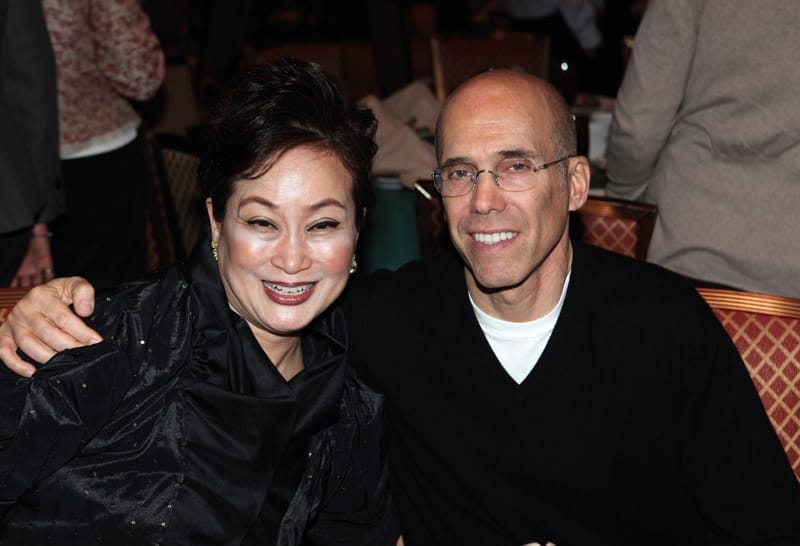
Miky Lee and Jeffrey Katzenberg attending CinemaCon 2011. Photo: Ryan Miller / Getty Images
In November 1995 Katzenberg made a four-day visit to South Korea, where he met with president Kim Young-sam at his palace. “Miky Lee was the Godfather,” Katzenberg told the LA Times after the trip. “She was pulling strings everywhere. There wasn’t a detail that she had not thought about.” The DreamWorks founders, he said, were “genuinely taken with Miky and her energy, enthusiasm, excitement and flat-out raw ambition”.
When Lee was quizzed on why a Korean food company was investing in Hollywood she gave an answer that sounded preposterous to Americans: “We’re pleasing [our customers’] mouths and their bodies, and now they want to be pleased with their eyes and ears.” Such a rationale may have raised eyebrows in the US, but in South Korea it didn’t seem an unusual thing for a member of the Lee family to say. Samsung is one of the country’s biggest chaebols, enormously powerful family-run conglomerates with long-established ties to government. Chaebols are rarely satisfied with dominating one industry. Samsung, for example, may be best known for its electronics, but it’s also a big player in life insurance, shipbuilding, theme parks, chemical manufacturing and luxury hotels. The company accounts for around 15 percent of the entire South Korean economy. Films would just represent another corporate finger in another pie.
Chaebollywood
Chaebols have traditionally benefited from a cosy relationship with the political elites. “We see the real rise of the chaebols in the 1960s and 1970s, under the authoritarian regime,” says Keung Yoon Bae, a Harvard academic studying East Asian culture. “The government sought to shape the economy in very specific ways by encouraging growth in certain industries. If you take your chaebol in the direction the government wants, you’re going to get the handouts, you’re going to get the tax breaks.” And in the 1990s the government, roused by Jurassic Park’s box office figures, wanted to make movies.
But making movies was something South Koreans had been lousy at for a long time. In her book The Birth of Korean Cool: How One Nation Is Conquering the World through Pop Culture, Euny Hong recalls how spectacularly uncool Korean culture was when she first arrived in the country. The music was atrocious – the authoritarian regime’s banning of ‘subversive’ and ‘decadent’ rock music hadn’t helped – the TV shows were amateurish and the films weren’t worth watching, a miserable mix of “formulaic cop dramas, doomed romances and moralistic films about vice and addiction”.
That’s not to say that the country didn’t have a filmmaking pedigree. “The first golden age of South Korean cinema was in the 1960s,” says Hyun Jin Cho, director of the London Korean Film Festival. Between the April Revolution of 1960, when students led mass protests which overthrew an authoritarian regime, and the military coup d’état carried out by Park Chung-hee just 13 months later, some of the greats of Korean cinema were made. Hyun points to The Housemaid, released during those 13 months of freedom, as one hugely influential movie. If its plot, about how a wealthy family’s life turns into a nightmare after they hire a scheming housekeeper, sounds familiar, that’s because Bong Joon-ho has cited it as a major inspiration for Parasite.
The director was kidnapped by North Korean agents and forced to make propaganda films for Kim Jong-il”
At first Park’s authoritarian government didn’t entirely stifle South Korean filmmakers. But it soon introduced strict censorship, elements of which continued even after the arrival of democracy in the late ’80s. The government had to approve all scripts before films could be made. Some directors were blacklisted and others had their studios closed. One of the greats of the first golden age, Shin Sang-ok, lost his filmmaking licence when he refused to follow the government’s orders. His career was revived in a most inopportune way. In 1978 he was kidnapped by North Korean agents, along with his ex-wife. He spent several years in prison before being forced to make propaganda films for Kim Jong-il, including the bizarre monster movie Pulgasari. He finally escaped the regime’s clutches by claiming political asylum at the US embassy in Vienna in 1986.
The North Korean dictator reportedly had a library of more than 15,000 films, wrote several books on cinema theory and had a particular fondness for Elizabeth Taylor. He also, if the rumours are to be believed, held in high regard the first major hit made by Miky Lee’s CJ Group. Joint Security Area, a copy of which was given to Kim as a gift by his counterpart in Seoul at a historic 2007 summit, had become the highest-grossing South Korean film in history upon its release in 2000.
Making waves
Directed by Park Chan-wook, Joint Security Area ushered in what Hyun describes as the second golden age of Korean cinema. In the early-to-mid-2000s, a group of filmmakers led what became known as the ‘Korean New Wave’. Park went on to make the super-violent cult classic Oldboy, one of Quentin Tarantino’s favourite films, while Oasis by Lee Chang-dong won the Silver Lion at Venice in 2002. Among this group of maverick talents was Bong Joon-ho. His debut, Barking Dogs Never Bite, showed potential, but it was his second film, Memories of Murder, a serial-killer thriller produced and distributed by the CJ Group, that established him as an accomplished filmmaker.
Only ten years after President Lee learned of Jurassic Park’s box office numbers, Korean cinema had been transformed. The CJ Group, and its staff shuttling between Hollywood and Seoul, was one contributing factor – but it couldn’t have been done without a spot of government intervention. The big turning point, the moment South Korea’s filmic fortunes really changed, came in the autumn of 1996.
Firstly, nine years after the overthrow of the authoritarian regime, the country’s constitutional court finally ended state censorship. And then the government put its weight behind the launch of the Busan International Film Festival (BIFF), the first international film festival in the country, and now the biggest event of its kind in Asia. It was a much-needed marketplace for Korean cinema, somewhere filmmakers could share ideas and make deals.
“History needs something crucial to light the fuse and so does the history of cinema,” says Jung Han-seok, the curator of the Korean cinema programme at BIFF, who believes that the festival spurred Korean film’s revival. “In the mid-1990s, many talented creators started to reveal themselves. They wished to see and make good films, and BIFF became a crucial place for communication and networking.”
In Pop Goes Korea, Mark Russell recalls some of the teething problems at the inaugural festival – guests got stranded at Busan’s airport, the hastily produced subtitles were often out of sync and the old downtown cinemas where the screenings took place were plagued with rats. When the organisers let alley cats loose in the theatres in a creative attempt to deal with the problem, they soon realised that the noisy, scampering street cats were even more distracting than the rodents and they had to be chased out of the venues.
If President Park Geun-hye had won a second term in office, it’s unlikely Parasite would have been made”
Despite the pest-control failures, the festival was a success and the numbers speak for themselves: in the 50 years before BIFF only four Korean films were screened at Cannes. But in 1998 alone, after a couple of years of serious schmoozing on Busan’s beaches, four Korean films made the journey to the French Riviera.
Alongside BIFF, the government also began increasing financial support for filmmakers. A film council was created, similar to the one in the UK, and in 2005 a government-backed fund of public and private money, totalling over $1 billion, was launched to promote Korean popular culture.
Hallyu breaks loose
Miky Lee’s CJ Group didn’t produce Bong’s follow-up to Memories of Murder, The Host, a characteristically genre-fluid monster movie which broke Korean box-office records upon its release in 2006. But Lee was executive producer on his next two movies, Mother and Snowpiercer, and by this time had arguably become the most powerful media mogul in the country. The Lee siblings’ CJ Group operated 18 TV channels (including Mnet, South Korea’s answer to MTV), the country’s biggest online gaming portal (CJ Games) and the world’s second-biggest home-shopping network (CJ O Shopping). They dominated pop music – almost a third of South Korea’s top 100 singles in 2011 were by CJ artists – and ran concerts and festivals throughout the country.
Lee and her brother started a 4D cinema subsidiary (in 2011 there were reportedly complaints to CJ 4DPlex that the water effects in a Pirates of the Caribbean film caused nausea and the burnt rubber smell pumped out during Transformers: Dark of the Moon triggered short-term deafness). And despite their wildly successful diversification project they hadn’t forgotten their roots in food production – they opened hundreds of restaurants throughout the world (including bibimbap specialist Bibigo in London) while their less-than-glamorous animal-feed division still brought in vast profits each year.
Increasingly, too, the CJ chaebol was making inroads overseas. It was at the forefront of Hallyu (literally, ‘Korean Wave’), a term used to describe the global rise of South Korean popular culture. The wave began with soapy, sentimental TV dramas which became popular throughout Asia; it wasn’t uncommon to see Nepalese or Kazakh teens copying the hairstyles of Korean actors from popular TV exports such as Winter Sonata and Boys Over Flowers.
By the start of the 2010s, Korean pop stars such as Girls’ Generation were dominating the Japanese charts, a highly symbolic development given the historical rivalry between the countries and Japan’s decades-long pop-cultural superiority in Asia. The manufactured, highly stylised ‘K-pop’ groups were also beginning to find a receptive audience in Europe – boyband Big Bang even defeated Britney Spears to win best worldwide act at the MTV Europe Music Awards in Belfast in 2011. Korea’s pop-cultural exports continued to get a helping hand from the government: in Paris, for example, the state-run Korean Cultural Centre would arrange K-pop club nights and dance classes for its rapidly growing local fanbase.
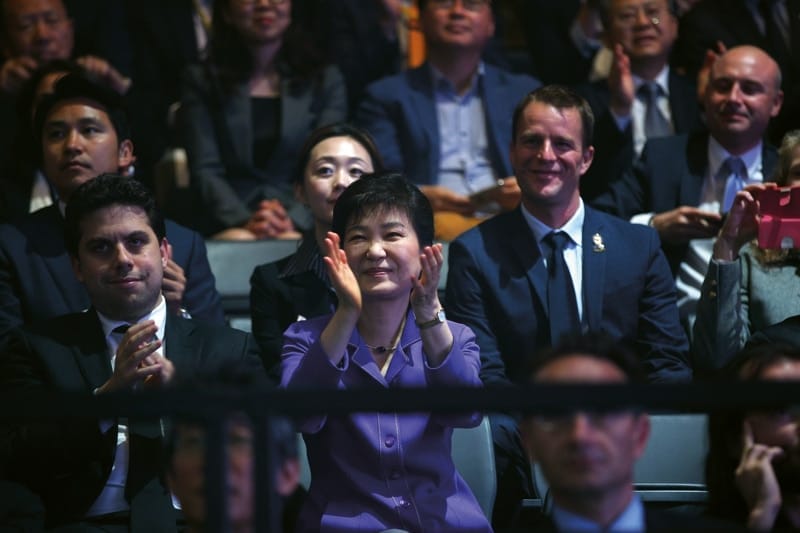
Park Geun-hye attends a K-pop concert in Paris in 2016. Photo: Thibault Camus / AFP via Getty Images
Hong argues that the South Korean government made Hallyu its number one priority. Others see that as a slight over-exaggeration – but it’s certainly the case that Seoul has shown a steely determination to move on from semiconductors. “Korean policymakers are enthusiastic about catching up with the so-called ‘advanced’ countries such as the UK, the US and France, in terms of culture,” says Hye-Kyung Lee, a King’s College London lecturer specialising in South Korean cultural policy. “It has been very goal-driven, and the goal has been to become one of the world’s five cultural powers. Korean policymakers don’t really talk in terms of soft power, but they do talk about Korea’s cultural influence, which can potentially strengthen the country’s international profile and its diplomatic power.”
Judging by the haircuts of Kathmandu youths circa 2010, this strategy was clearly working, yet at that time Lee didn’t seem any closer to achieving her dream of making Korean culture big in America. But she had a plan. In 2012 her CJ Group organised the inaugural KCON convention, a celebration of Korean culture in LA. Only a few hundred people showed up and the event lost money. But a revolution was brewing. A few months later, ‘Gangnam Style’ by Psy, a catchy hip-hop song making fun of a wealthy Seoul neighbourhood, reached number one in more than 30 countries and became the most viewed video ever on YouTube. At KCON two years later, boyband BTS played their second-ever US show, at which they performed dressed as schoolboys. The naffness did them no harm. In 2019 the seven-member group from Seoul became the first band in the history of the Billboard charts to spend five weeks at number one. That year 158,000 people attended the KCON events in LA and New York, which the organisers said celebrated K-beauty, K-food and K-lifestyle, as well as K-pop and K-film.
The Bong show
Be it Bong or bibimbap, wherever there was a K-hyphen the CJ Group loomed large. Its sway over Korean popular culture prompted the following tweet by Keung Yoon Bae when Parasite picked up best picture at the Oscars. “Incredibly moving yet also deeply ironic to see CJ vice chairwoman Miky Lee up on the stage for Parasite,” Keung wrote. “She’s been a steadfast champion for Korean cinema for decades and her acceptance of the award is well-deserved, yet she is also the most chaebol of all chaebols. These leftist, anti-wealth messages in cinema often seem to be funded by the chaebols.” Her tweet went viral.
The CJ Group isn’t quite the biggest of the chaebols – it’s reportedly in 14th place, with assets of over $25 billion. But you get the Harvard academic’s point. A billionaire media mogul giving an acceptance speech for a film that criticises wealth disparity is ironic. And not everyone in South Korea celebrated Parasite’s win like a golden goal in the World Cup. Some believe that CJ’s dominance of the film industry is unhealthy in the long term and that while fêted auteurs such as Bong get unlimited financial support and artistic freedom, many lesser-known directors don’t get opportunities because they operate outside of the CJ orbit.
Keung laughs when asked if Lee is a covert leftist, using her films to subvert the system. “She’s definitely not a leftist, I can tell you that now,” Keung replies. Lee invests in products that sell, Keung says, whether it’s formulaic K-pop or the subversive works of auteurs such as Bong. “In the 2000s there developed this cadre of directors who are critically acclaimed and popular, and their personal politics are lefty. But their films are financially successful and this leads to the fact that they get made.”
With Bong no longer an enemy of the state, he and Miky Lee joined forces once again to make their masterwork”
Despite having their eyes on the financial prize, in 2015 both Miky Lee and Bong Joon-ho were blacklisted by a conservative government for being leftists. Park Geun-hye, the daughter of former dictator Park Chung-hee, whose authoritarian government took South Korean cinema to the dark ages in the 1970s, was elected the country’s first female leader in 2012. Five years later she was impeached and ousted from office for her role in a corruption scandal, but not before she had revived her father’s backward stance on media freedom. Her conservative predecessor, Lee Myung-bak, created a secret blacklist, and she expanded it to more than 9,000 artists, including Bong, Joint Security Area director Park Chan-wook and many other filmmakers who were to be quietly cut off from government support.
In internal government papers, Bong was accused of using monster movie The Host to “push society leftward” and crime thriller Memories of Murder to “inject negative impressions of the police” (after he won his Oscar, conservative politicians who had initially called Parasite a “commie flick” would reread the national mood and call for a statue of Bong to be erected, a street to be named after him and a film museum to be created in his honour in his hometown of Daegu).
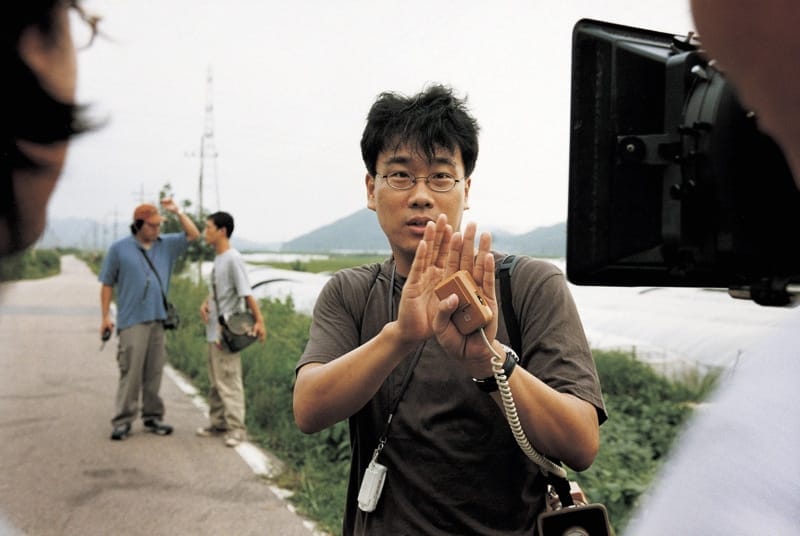
Bong Joon-ho on the set of his 2003 breakout hit Memories of Murder. Photo: Alamy
The pioneering Busan film festival also fell foul of the Park government. It had its state funding cut in half, ostensibly as punishment for screening a documentary that was critical of the Park administration’s handling of the 2014 Sewol ferry disaster, in which nearly 300 people drowned, most of them schoolchildren.
Miky Lee had suddenly left the CJ Group in 2013 and gone to live in the US, citing health concerns. An alternative explanation for her departure emerged some years later. Park’s administration had coerced the CJ Group to oust her because the president was reportedly angry about a sketch on South Korea’s version of Saturday Night Live, made by one of CJ’s TV channels, which portrayed the politician as an infantile Teletubby. When Lee returned to management a couple of years later, the group was in the midst of a major crisis as her brother Lee Jay-hyun had been sentenced to prison for embezzlement and tax evasion. He was pardoned by President Park in 2016.
If Park had won a second term in office, it’s unlikely Parasite would have been made. But with Moon Jae-in as president, Miky Lee back at CJ’s helm and Bong no longer an enemy of the state, the pair joined forces once again to make their masterwork. It had long been assumed that Americans would never overcome what Bong refers to as the “one-inch barrier” of subtitles, but with millions of them listening to pop music in Korean, the language divide no longer seemed so wide. And for many months before Oscar night, the woman Jeffrey Katzenberg called the Godfather was using her enviable connections, pulling strings everywhere. In an expensive campaign funded by CJ and run by Hollywood agency IDPR, the Parasite team lobbied the Academy’s 8,000 members, holding VIP screenings of the film, hosting lavish parties and receptions and getting Bong, who had temporarily moved to LA just to promote his film in the US, a coveted guest spot on Late Night with Jimmy Fallon.
By 9th February 2020, all the pieces had fallen perfectly into place. If you listen carefully while watching the footage of the Academy Awards, you can hear the gasps when Jane Fonda opens the envelope and declares that Parasite has won best picture. Its director and executive producer may not have been quite as surprised as the rest of us.
For our failsafe guide to winning an Academy Award for acting, see our infographic from DG #38, ‘How to win an Oscar’.
Slow Journalism in your inbox, plus infographics, offers and more: sign up for the free DG newsletter. Sign me up
Thanks for signing up.








